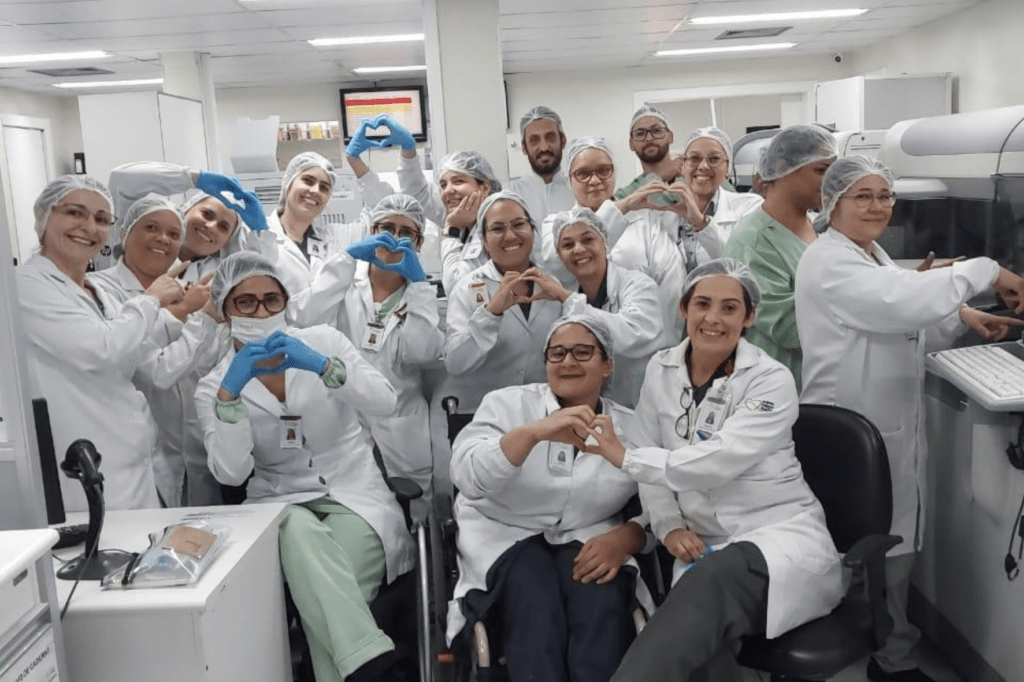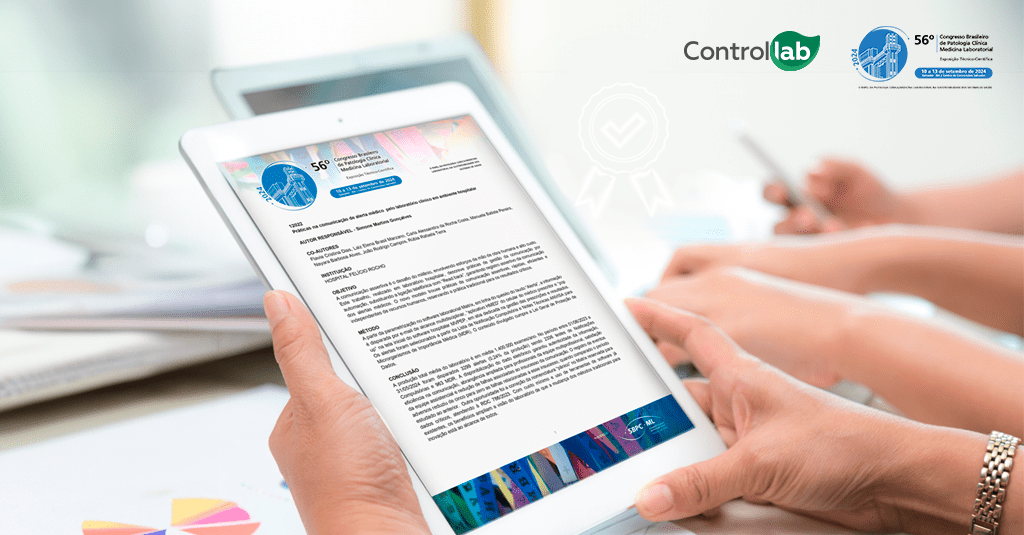Hospital Felício Rocho, which presented an innovative work on medical alert communication at the 56th CBPC/ML, stood out in the award named after the founder of Controllab.
Between September 10 and 13, the 56th Brazilian Congress of Clinical Pathology and Laboratory Medicine – CBPC/ML – took place in Salvador, BA. As in all editions of the Congress, the Free Themes session is always one of the most competitive; this year, around 550 papers were submitted.
The director of education at SBPC/ML, Dr. Leonardo Vasconcellos, explains that the Free Themes session is essential for the congress: “it shows us how our colleagues are working, whether by validating products, reporting a clinical case or a case series, comparing methods, or presenting clinical-laboratory innovations.” He also emphasizes: “these are the trends in our field or topics that may have relevance for public health.”
Award for Free Themes
As a form of recognition, seven papers are chosen to receive special awards, named after prominent figures in laboratory medicine.
This year, SBPC/ML created the “Dr. Marcio Mendes Biasoli: Proficiency Testing and Laboratory Indicators” award. The goal was to celebrate the career and legacy of a professional who dedicated his life to promoting reliability in laboratory quality control processes, presiding over Controllab, a reference in quality control in Latin America, for more than 44 years.

Vinicius Biasoli, his son and CEO of Controllab, highlighted: “The award goes beyond Proficiency Testing, Laboratory Indicators, Internal Control, or any other quality control tool. It represents ethics, humanity, innovation, education, and pioneering.”
Award-winning work
The work titled “Practices in Medical Alert Communication by the Clinical Laboratory in a Hospital Setting,” conducted by Hospital Felício Rocho, won the Dr. Marcio Mendes Biasoli Award.
This study, led by Dr. Simone Martins Gonçalves, along with co-authors Flavia Cristina Dias, Laiz Elena Brasil Marzano, Carla Alessandra da Rocha Costa, Manuela Batista Pereira, Nayara Barbosa Alves, João Rodrigo Campos, and Rúbia Rafaela Terra, stood out for its innovation in using automation for medical alerts, implemented through parameterization in the laboratory software of the technology company Matrix.

Dr. Simone commented on the importance of this innovative practice: “The work stemmed from the challenge of expanding tools for alert communication with assertive and simultaneous reach for both the multidisciplinary team and doctors, in order to ensure clinical governance, addressing the ongoing complaints from the operational team about the failures in conveying information through traditional phone calls.”
Automation in medical alert communication
The new automated approach allows alerts to reach doctors and multidisciplinary teams simultaneously, facilitating an immediate response.
Regarding this transformation, Dr. Simone explains: “With automation, we were able to eliminate errors that occurred due to incorrect transcriptions or oral communication failures. This not only optimized our time but also brought more security to our routine, ensuring that the doctor and the multidisciplinary team receive the information at the same time and clearly. Additionally, it is no longer necessary for professionals to spend time manually transmitting data, which has freed up space for other important activities, such as Stewardship practices in microbiology.”
Impact on indicators and patient safety
Automation also brought measurable results in the laboratory’s efficiency indicators.
According to Dr. Simone, a significant reduction in response time for critical results was observed, with notifications being received within an hour. This reduced time is essential for making quick and assertive decisions in favor of patient safety.
She also emphasizes the importance of team adherence: “An indicator that, in our view, managers should pay close attention to is the Team Satisfaction Percentage in Internal Surveys. In our laboratory’s case, team adherence was satisfactory, with voluntary reports indicating that the automation in communication practices was concrete evidence of valuing the team’s feedback.”
The legacy of Marcio Mendes Biasoli
In light of the award, Dr. Simone reflects on the personal and professional significance of this recognition: “When we were informed about the Dr. Marcio Mendes Biasoli Award, in the Proficiency Testing and Indicators category, we were literally overflowing with joy. It was a celebration, as the entire team recognizes that the image of Dr. Marcio Mendes Biasoli embodies commitment to quality and the mission of providing precision medicine in test tubes.”
The award-winning work highlights the positive impact of automation in laboratory medicine, inspiring continuous improvements and reinforcing the importance of quality and safety in hospital care.
May the values represented in the Dr. Marcio Mendes Biasoli Award continue to inspire professionals in the field to enhance their practices and promote reliability in laboratory quality control processes.

